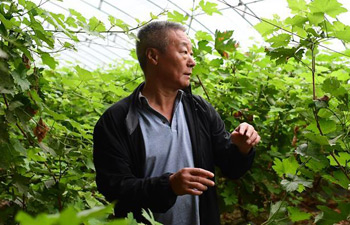CHENGDU, Sept. 11 (Xinhua) -- Tian Jingyu, 69, used to be a police officer, but has been even busier after retirement.
Tian's home is in the Beiyuan neighborhood, where 1,300 people live in the southwestern part of Chengdu, capital of Sichuan Province.
He is busy because he leads a five-member council that discusses issues of importance to the neighborhood.
"Things can be small or big. From sewerage to fences, from roads to garbage centers, we respond to matters of collective importance," Tian said.
Before the council was set up, such matters were managed by Jinyang community, the upper-level administrative body. The decision process was top-down and mandatory.
"Setting up resident councils at each neighborhood is a practice of grassroots democracy, letting the people decide," said Li Hanrong, Communist Party chief of Jinyang. A total of 40,000 people live in Jinyang, administered by Wuhou District.
Chengdu, with a population of 16 million, started to experiment with the council system from 2003. By 2012, councils had been established in 4,338 communities and villages across the city.
"Democracy brings changes to the people. It has got people moving on their feet rather than sitting on a bench and waiting," Li said.
Since December last year, Tian has convened with other councilors on three matters: repairing a dilapidated gate, reconstructing a fire-fighting passage and installing anti-burglar wiring.
"We meet on the tenth of every month, though we meet more when there are matters waiting to be solved," Tian said.
"For the construction projects, we need to make the budget ourselves, and we do that in a very meticulous way, because at least half of the cost will be paid by fellow residents. The rest is covered by the community construction fund," he said.
Tian and other council members solicited public suggestions on each project. The final decisions were put on walls for a week in April to notify the public, before being handed to the upper level.
Beiyuan's infrastructure spending needs to get two-thirds of votes from a 37-member council meeting.
"Four projects, including ours, were approved this year. We were lucky, because at least nine projects were vetoed in the last three years," Tian said.
After gaining approval, Tian called five more meetings to discuss details before construction started.
"We compared construction teams and their plans thoroughly, and our final choice saved 1,500 yuan (about 230 dollars)," he said.
Since the 18th Communist Party of China (CPC) National Congress in 2012, China has strived to build a grassroots governance system, led by local governments and participated in by the general public.
Delegating government power to responsible and committed people like Tian is a solution adopted by many Chinese cities to address the increasingly complex desires of the public.
At a meeting in early September, Chengdu set up a community governance committee at the city level to make sure the council system works.
As the councilors exercise autonomy, a supervisory board supervises them.
"Listen to the people, let them vote, and allow public opinion to be fully expressed, not after but before government decisions, even if it is about very trivial things like whether a room should be used as a food store or a barber's shop," said Wang Yukai, professor with the Chinese Academy of Governance. "Governance is to understand needs and respond effectively to them, taking in suggestions. Only by doing this can so-called vanity projects be avoided."
Last week, at Guanyuan neighborhood in Xicheng District in Beijing, more than 40 people were elected by residents to vote on what types of groceries a new service center should offer.
The center replaces several farmers' markets, which were closed in a city-wide campaign to reinvigorate nearly 2,500 alleys in the core districts of Dongcheng and Xicheng.
"If the public has suggestions or complaints as to the quality and price of groceries, I'm ready to hear them out. If people decide the contractor is too expensive, they have the right to vote to replace it," said Xu Li, deputy head of Xicheng District, at the public vote on Sept. 4.
Zhao Xiuling, a political scientist at the Chinese Academy of Sciences, said local governments, particularly in big and developed cities, had created many ways to govern communities.
Creative methods in some cities have been hailed as inspirational models of grassroots democracy in China. Wenling City in east China's Zhejiang Province is one such pioneer.
In 1999, the costal city adopted democratic consultation, featuring civic participation as well as face-to-face dialogue between government and the public in designing and carrying out public policy.
"The most effective governance is to get people involved. Rubber stamping solves no problem; only full participation does," said Yu Meixiang, a local official at Taidong neighborhood in Xujiahui District of Shanghai.
Retired officer Tian receives no wages for his time-consuming work, though he does get a hundred yuan or so every month to cover his phone expenses.
"I'm more than happy to do my job. It is my responsibility as well as my right," Tian said.

















